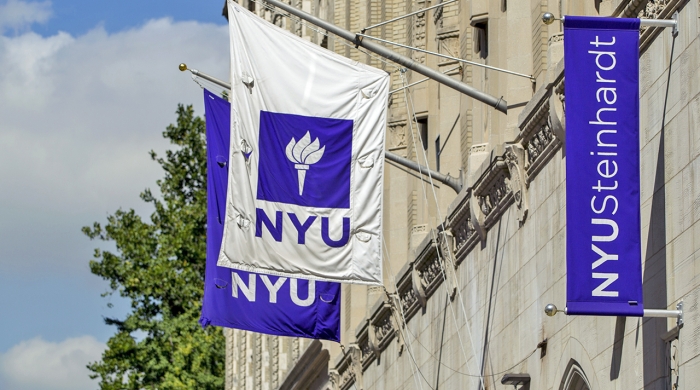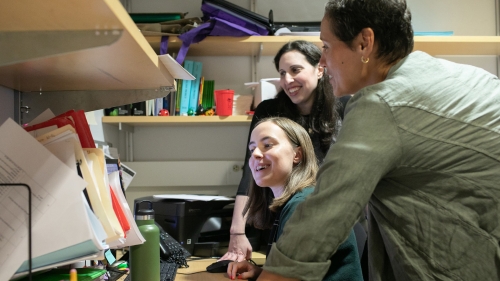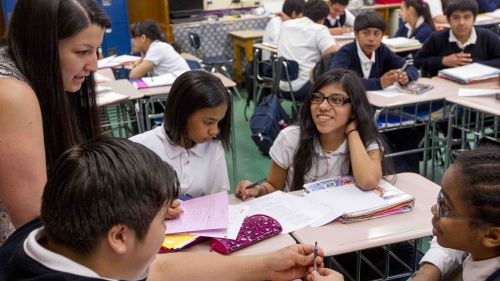Alejandro Ganimian, assistant professor of applied psychology and economics, and Kongji Qin, assistant professor of TESOL, bilingual, and world language education, have both received National Academy of Education/Spencer Postdoctoral Fellowships to support their education research.
The fellowship supports 25 early-career scholars who are making significant scholarly contributions to the field of education. In addition to $70,000 of funding, the program also offers recipients professional development activities alongside other National Academy of Education members.
Classroom Observation to Identify Teacher Attentiveness to Students' Needs
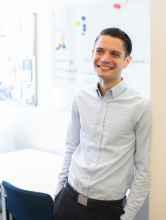
Ganimian’s research is on how teachers in low- and middle-income countries interact with the students in their classrooms, and how their own assumptions and biases may play into who receives attention – and who does not.
“Over the past two decades, many developing countries have seen a rapid expansion of schooling, which means not only more students, but also more variability in their level of preparation for school,” says Ganimian. “These educational systems were originally designed for school-ready students who knew what to expect, and now some students are in formal education for the first time.”
Previous research on teacher interactions has documented several patterns, including that teachers tend to focus on students who are better prepared and those who perform better on high-stakes exams. Ganimian thinks another reason is that teachers underestimate the number of underperforming students in their classroom and the degree to which they underperform – a misperception that affects the way they teach.
Ganimian seeks to better understand this challenge by creating a new classroom observation protocol that maps which students the teachers interact with and when. This process will be developed and piloted in Bangladesh, with the hopes to run comparable studies in schools in South Asia and Sub-Saharan Africa that have similar institutional features and pressures.
“This kind of observation can help demonstrate patterns for many different subconscious biases, including race and ethnicity, low test scores, gender identity, income, and even location in the classroom, such as front row versus back row,” says Ganimian. “The hope is to see if these behaviors are predictive of student learning gains or losses with the possibility to replicate this kind of classroom observation for teachers around the world.”
Countering Xenophobia and Racism through Critical Language Instructions with Immigrant Students
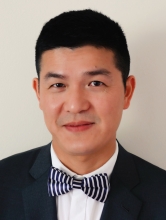
Qin’s fellowship research examines how language classrooms can be the site for social change by supporting immigrant students to learn and use their critical language skills to counter the impact of recent anti-immigration rhetoric and racism.
“Over the past few years, attacks on immigrants and their communities have ramped up, and young people are particularly affected, from their learning to their mental health and well-being,” says Qin. “We want to study how language teachers can incorporate the social reality of anti-immigrant sentiment into their classrooms with immigrant learners, and how students can be supported to use their language skills to understand the ideology around immigration and stand up for themselves and their communities to change the social realities.”
Qin will be conducting his research in New York City. He will be first collaborating with high school teachers of immigrant students to design a unit of language curriculum that centers on immigration issues and inequalities. The teachers will then teach the unit to their immigrant students to develop their critical and language skills to both understand social inequalities related to xenophobia and racism and to act upon them.
Students will be supported to use their critical language skills by looking at news and social media content to see how people circulate anti-immigration rhetoric, and then think about how they can counter those ideologies using their own voice and stories.
“I’m excited for the opportunity and for the support to help launch the project,” says Qin. “One of the most important things about the National Academy of Education/Spencer Postdoctoral Fellowship Program is that it supports a generation of junior scholars who are not only doing important research, but also the bigger work of theory building to become leaders in their fields.”
Qin’s goal with this research is to develop more robust and anti-oppressive language and literacy education for immigrant learners.
Related Articles
Two NYU Steinhardt Professors Selected as 2022 National Academy of Education/Spencer Postdoctoral Fellows
Professors Alejandro Ganimian and Kongji Qin are among the 25 fellows selected.
Janet Njelesani Awarded (NAEd)/Spencer Fellowship to Study Violence Against Students with Disabilities in Zambia
Janet Njelesani’s project, “Generating and Preventing Violence: Schools’ Responses to School Violence Against Students with Disabilities in Zambia,” will investigate how social, cultural, and institutional practices influence inclusion, protection, and education for children with disabilities.
Partner Spotlight: The Spencer Foundation
From research grants to joint fellowships, Spencer and Steinhardt are connecting for research in the field of education.

